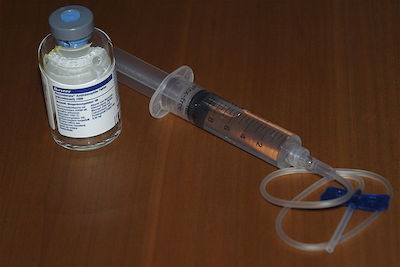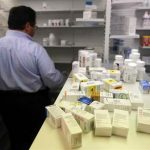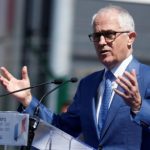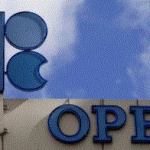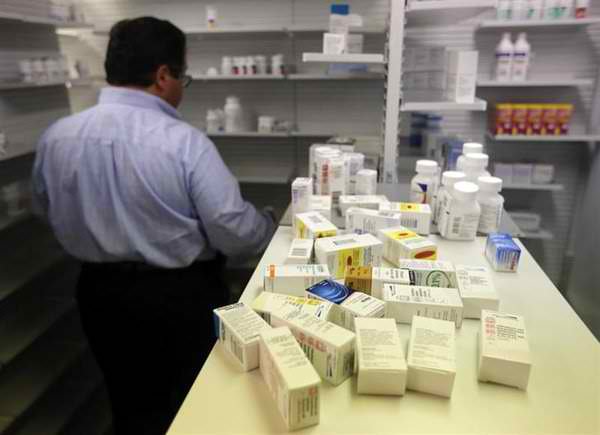A costly new Roche Holding AG drug to treat the bleeding disorder hemophilia A could significantly reduce healthcare expenses for certain patients, a draft report from an independent U.S. nonprofit organization that evaluates clinical and cost effectiveness of new medicines said on Friday.
The drug, Hemlibra, or emicizumab, was approved by the Food and Drug Administration in November as a once-weekly injection for adults and pediatric patients with hemophilia A who have developed inhibitors, or resistance, to other treatments. Roche’s medicine is required to carry a black box warning, the most serious, about the risk of blood clots.
The Institute for Clinical and Economic Review (ICER) found that, for such patients aged 12 years and older, emicizumab at current wholesale prices would reduce spending by around $1.85 million per patient annually. In patients under 12 years of age, emicizumab would reduce costs by about $720,000 per patient annually.
Hemophilia is a rare bleeding disorder in which a clotting protein is missing or does not function normally. Roche plans to charge about $482,000 for the first year of treatment and $448,000 a year after that.
To avoid joint damage and other complications, patients with severe hemophilia need regular infusions of very expensive clotting factors. About 25 percent of people with severe hemophilia A develop factor antibodies, called inhibitors, at some point, making it difficult to control bleeding without very high doses of clotting factors or other expensive treatments known as bypassing agents.
Hemlibra is an antibody designed to activate the natural coagulation cascade and restore the blood clotting process for hemophilia A.
ICER noted in its analysis that hemophilia is a lifelong disease that creates substantial burdens for patients.
A costly new Roche Holding AG drug to treat the bleeding disorder hemophilia A could significantly reduce healthcare expenses for certain patients, a draft report from an independent U.S. nonprofit organization that evaluates clinical and cost effectiveness of new medicines said on Friday.
The drug, Hemlibra, or emicizumab, was approved by the Food and Drug Administration in November as a once-weekly injection for adults and pediatric patients with hemophilia A who have developed inhibitors, or resistance, to other treatments. Roche’s medicine is required to carry a black box warning, the most serious, about the risk of blood clots.
The Institute for Clinical and Economic Review (ICER) found that, for such patients aged 12 years and older, emicizumab at current wholesale prices would reduce spending by around $1.85 million per patient annually. In patients under 12 years of age, emicizumab would reduce costs by about $720,000 per patient annually.
Hemophilia is a rare bleeding disorder in which a clotting protein is missing or does not function normally. Roche plans to charge about $482,000 for the first year of treatment and $448,000 a year after that.
To avoid joint damage and other complications, patients with severe hemophilia need regular infusions of very expensive clotting factors. About 25 percent of people with severe hemophilia A develop factor antibodies, called inhibitors, at some point, making it difficult to control bleeding without very high doses of clotting factors or other expensive treatments known as bypassing agents.
Hemlibra is an antibody designed to activate the natural coagulation cascade and restore the blood clotting process for hemophilia A.
ICER noted in its analysis that hemophilia is a lifelong disease that creates substantial burdens for patients.
A costly new Roche Holding AG drug to treat the bleeding disorder hemophilia A could significantly reduce healthcare expenses for certain patients, a draft report from an independent U.S. nonprofit organization that evaluates clinical and cost effectiveness of new medicines said on Friday.
The drug, Hemlibra, or emicizumab, was approved by the Food and Drug Administration in November as a once-weekly injection for adults and pediatric patients with hemophilia A who have developed inhibitors, or resistance, to other treatments. Roche’s medicine is required to carry a black box warning, the most serious, about the risk of blood clots.
The Institute for Clinical and Economic Review (ICER) found that, for such patients aged 12 years and older, emicizumab at current wholesale prices would reduce spending by around $1.85 million per patient annually. In patients under 12 years of age, emicizumab would reduce costs by about $720,000 per patient annually.
Hemophilia is a rare bleeding disorder in which a clotting protein is missing or does not function normally. Roche plans to charge about $482,000 for the first year of treatment and $448,000 a year after that.
To avoid joint damage and other complications, patients with severe hemophilia need regular infusions of very expensive clotting factors. About 25 percent of people with severe hemophilia A develop factor antibodies, called inhibitors, at some point, making it difficult to control bleeding without very high doses of clotting factors or other expensive treatments known as bypassing agents.
Hemlibra is an antibody designed to activate the natural coagulation cascade and restore the blood clotting process for hemophilia A.
ICER noted in its analysis that hemophilia is a lifelong disease that creates substantial burdens for patients.
A costly new Roche Holding AG drug to treat the bleeding disorder hemophilia A could significantly reduce healthcare expenses for certain patients, a draft report from an independent U.S. nonprofit organization that evaluates clinical and cost effectiveness of new medicines said on Friday.
The drug, Hemlibra, or emicizumab, was approved by the Food and Drug Administration in November as a once-weekly injection for adults and pediatric patients with hemophilia A who have developed inhibitors, or resistance, to other treatments. Roche’s medicine is required to carry a black box warning, the most serious, about the risk of blood clots.
The Institute for Clinical and Economic Review (ICER) found that, for such patients aged 12 years and older, emicizumab at current wholesale prices would reduce spending by around $1.85 million per patient annually. In patients under 12 years of age, emicizumab would reduce costs by about $720,000 per patient annually.
Hemophilia is a rare bleeding disorder in which a clotting protein is missing or does not function normally. Roche plans to charge about $482,000 for the first year of treatment and $448,000 a year after that.
To avoid joint damage and other complications, patients with severe hemophilia need regular infusions of very expensive clotting factors. About 25 percent of people with severe hemophilia A develop factor antibodies, called inhibitors, at some point, making it difficult to control bleeding without very high doses of clotting factors or other expensive treatments known as bypassing agents.
Hemlibra is an antibody designed to activate the natural coagulation cascade and restore the blood clotting process for hemophilia A.
ICER noted in its analysis that hemophilia is a lifelong disease that creates substantial burdens for patients.
A costly new Roche Holding AG drug to treat the bleeding disorder hemophilia A could significantly reduce healthcare expenses for certain patients, a draft report from an independent U.S. nonprofit organization that evaluates clinical and cost effectiveness of new medicines said on Friday.
The drug, Hemlibra, or emicizumab, was approved by the Food and Drug Administration in November as a once-weekly injection for adults and pediatric patients with hemophilia A who have developed inhibitors, or resistance, to other treatments. Roche’s medicine is required to carry a black box warning, the most serious, about the risk of blood clots.
The Institute for Clinical and Economic Review (ICER) found that, for such patients aged 12 years and older, emicizumab at current wholesale prices would reduce spending by around $1.85 million per patient annually. In patients under 12 years of age, emicizumab would reduce costs by about $720,000 per patient annually.
Hemophilia is a rare bleeding disorder in which a clotting protein is missing or does not function normally. Roche plans to charge about $482,000 for the first year of treatment and $448,000 a year after that.
To avoid joint damage and other complications, patients with severe hemophilia need regular infusions of very expensive clotting factors. About 25 percent of people with severe hemophilia A develop factor antibodies, called inhibitors, at some point, making it difficult to control bleeding without very high doses of clotting factors or other expensive treatments known as bypassing agents.
Hemlibra is an antibody designed to activate the natural coagulation cascade and restore the blood clotting process for hemophilia A.
ICER noted in its analysis that hemophilia is a lifelong disease that creates substantial burdens for patients.
A costly new Roche Holding AG drug to treat the bleeding disorder hemophilia A could significantly reduce healthcare expenses for certain patients, a draft report from an independent U.S. nonprofit organization that evaluates clinical and cost effectiveness of new medicines said on Friday.
The drug, Hemlibra, or emicizumab, was approved by the Food and Drug Administration in November as a once-weekly injection for adults and pediatric patients with hemophilia A who have developed inhibitors, or resistance, to other treatments. Roche’s medicine is required to carry a black box warning, the most serious, about the risk of blood clots.
The Institute for Clinical and Economic Review (ICER) found that, for such patients aged 12 years and older, emicizumab at current wholesale prices would reduce spending by around $1.85 million per patient annually. In patients under 12 years of age, emicizumab would reduce costs by about $720,000 per patient annually.
Hemophilia is a rare bleeding disorder in which a clotting protein is missing or does not function normally. Roche plans to charge about $482,000 for the first year of treatment and $448,000 a year after that.
To avoid joint damage and other complications, patients with severe hemophilia need regular infusions of very expensive clotting factors. About 25 percent of people with severe hemophilia A develop factor antibodies, called inhibitors, at some point, making it difficult to control bleeding without very high doses of clotting factors or other expensive treatments known as bypassing agents.
Hemlibra is an antibody designed to activate the natural coagulation cascade and restore the blood clotting process for hemophilia A.
ICER noted in its analysis that hemophilia is a lifelong disease that creates substantial burdens for patients.
A costly new Roche Holding AG drug to treat the bleeding disorder hemophilia A could significantly reduce healthcare expenses for certain patients, a draft report from an independent U.S. nonprofit organization that evaluates clinical and cost effectiveness of new medicines said on Friday.
The drug, Hemlibra, or emicizumab, was approved by the Food and Drug Administration in November as a once-weekly injection for adults and pediatric patients with hemophilia A who have developed inhibitors, or resistance, to other treatments. Roche’s medicine is required to carry a black box warning, the most serious, about the risk of blood clots.
The Institute for Clinical and Economic Review (ICER) found that, for such patients aged 12 years and older, emicizumab at current wholesale prices would reduce spending by around $1.85 million per patient annually. In patients under 12 years of age, emicizumab would reduce costs by about $720,000 per patient annually.
Hemophilia is a rare bleeding disorder in which a clotting protein is missing or does not function normally. Roche plans to charge about $482,000 for the first year of treatment and $448,000 a year after that.
To avoid joint damage and other complications, patients with severe hemophilia need regular infusions of very expensive clotting factors. About 25 percent of people with severe hemophilia A develop factor antibodies, called inhibitors, at some point, making it difficult to control bleeding without very high doses of clotting factors or other expensive treatments known as bypassing agents.
Hemlibra is an antibody designed to activate the natural coagulation cascade and restore the blood clotting process for hemophilia A.
ICER noted in its analysis that hemophilia is a lifelong disease that creates substantial burdens for patients.
A costly new Roche Holding AG drug to treat the bleeding disorder hemophilia A could significantly reduce healthcare expenses for certain patients, a draft report from an independent U.S. nonprofit organization that evaluates clinical and cost effectiveness of new medicines said on Friday.
The drug, Hemlibra, or emicizumab, was approved by the Food and Drug Administration in November as a once-weekly injection for adults and pediatric patients with hemophilia A who have developed inhibitors, or resistance, to other treatments. Roche’s medicine is required to carry a black box warning, the most serious, about the risk of blood clots.
The Institute for Clinical and Economic Review (ICER) found that, for such patients aged 12 years and older, emicizumab at current wholesale prices would reduce spending by around $1.85 million per patient annually. In patients under 12 years of age, emicizumab would reduce costs by about $720,000 per patient annually.
Hemophilia is a rare bleeding disorder in which a clotting protein is missing or does not function normally. Roche plans to charge about $482,000 for the first year of treatment and $448,000 a year after that.
To avoid joint damage and other complications, patients with severe hemophilia need regular infusions of very expensive clotting factors. About 25 percent of people with severe hemophilia A develop factor antibodies, called inhibitors, at some point, making it difficult to control bleeding without very high doses of clotting factors or other expensive treatments known as bypassing agents.
Hemlibra is an antibody designed to activate the natural coagulation cascade and restore the blood clotting process for hemophilia A.
ICER noted in its analysis that hemophilia is a lifelong disease that creates substantial burdens for patients.

